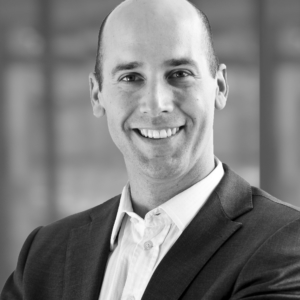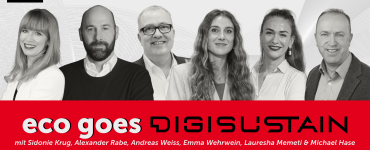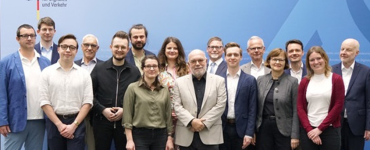As of January 2018, Alexander Rabe has joined Harald A. Summa as Managing Director in leading Europe’s largest association of the Internet industry. Rabe was previously Head of eco’s Capital Office, a role he took over in September 2016 alongside his position as Head of the Policy, Law and Regulations Division. In a short interview, he explains, among other things, where he sees the focal points of his future work.
Mr Rabe, congratulations on your new position at eco! Which aspects of your new role are you particularly looking forward to?
In the past few years, in its role as a source of inspiration and knowledge and a network partner for politics and industry, eco has managed to secure its position in the industry and within digitalizations’s extremely dynamic environment on the strength of its level-headed approach and its value-based orientation. As a dependable partner who instils confidence, we have filled a gap in the association landscape. In times of digitalization, I believe that this composure is precisely the defining feature that distinguishes us and makes us attractive to our members.
What I am particularly looking forward to is continuing this work with the entire eco team at our various locations and to building on these strengths together. Working as Managing Director of the largest Internet industry association in Europe at this juncture will enable me to set the decisive course for the future of our association together with our Management Board and Harald A. Summa.
In concrete terms, I am of course especially looking forward to working closely with our members. One of our first activities will be to establish an alliance to strengthen digital infrastructures, an alliance which we want to bring into being in 2018 in order to obtain an appropriate hearing on a federal political level for a strong group of eco members.
As an association, eco has evolved precisely from this segment of infrastructure providers, and this is where the nucleus of today’s digitalization boom as we are currently experiencing it resides. None of the applications with which we are now familiar would be available to us in their current form without data centers, and colocation or cloud providers. Creating this awareness of interrelationships and incorporating these into federal politics will be a challenge for the alliance in 2018.
Where do you see the core emphases of your future work?
In the future, I will focus increasingly on the further development of the association’s work in the areas of politics, law and regulations, member services, marketing and events, as well as the newly created division for Digital Business Models. My area of responsibility also includes the two cross-divisional departments of “Association Communication” and “International”, both of which I regard as important elements in promoting the positive external impact of the association and furthering our strategy of global expansion.
Today, with our more than 1,000 member companies, we represent the entire spectrum of digitalization. This naturally also presents a challenge to the organizational structure of the association – we need to always be ahead of the game in identifying early on those topics of relevance to our members and in catering appropriately for these topics.
We must be the industry’s driving force and knowledge provider and a partner who can always be relied upon, and we must constantly seek discourse, even when it comes to complex or controversial issues. Good association work is called for precisely at this point and, in the interests of our members, such discourse produces a progressive and modern network policy, thus creating the suitable basis for a digital transformation of society and the economy.
You headed up the association’s Capital Office from September 2016. How will you benefit from this experience in your new position?
The experiences I gained as Head of Policy, Law and Regulations for the association in Berlin will undoubtedly help me in my further work. The most important insight is probably this: that none of the topics dealt with in the association should be considered or addressed in isolation – the topics are all closely interrelated.
As such, the task now is to identify the synergy potentials of the divisions, for example in the area of policy and law, or in that of member services, and then to make optimum use of them. With our highly motivated and high-performance team at eco, I have no doubt that we will be able to achieve this and make eco fit for the future.
Where do you see the biggest challenges for the digital industry in Germany and Europe in 2018?
In Germany and Europe, we need to establish a constructive digital policy that does not lead us into defensive battles with providers from other regions of the world, but rather which allows us to shape digitalization in an independent and self-confident manner. How do we, supported by technological innovations, want to live in 25 years? This vision should become the guiding principle of politics at national and international level.
The digital political narrative must now be formulated in Germany and Europe so that we can pave the correct way for the future. Policy-makers should draft this digital-political narrative together with business, academia, and society, so that the transformation process of digitalization is perceived positively across the board, and the widespread skepticism about technology can yield to a positive vision of the future that we want to collectively realize.
As the branch association of the Internet industry, I believe we also have the task of whetting an appetite for digitalization, taking everyone along with us and showcasing its potentials. And its potentials are immense, so long as we don’t downplay them due to a German fear of technology.
A strong mechanical engineering sector offers the basis for an innovative application of Industry 4.0 as a top-selling export; a world-leading automotive industry that actively gets to grips with change can shape the future of autonomous and environmentally-friendly driving; a care system that uses digitalization for the benefit of patients and caregivers, or an energy transition that embraces all the possibilities of digitalization – all of these could, if properly configured, lead to the strengthening and well-being of not only our societies, but also a future economic system. We are committed to this as an association and, on the basis of concrete application examples, intend to further expand our strengths as an industry and to use these to our strategic advantage.




